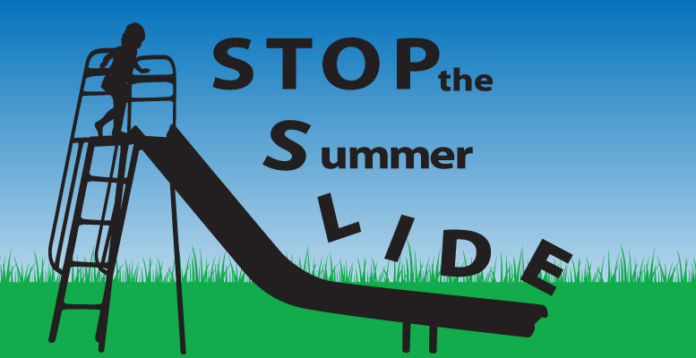
The loss of learning each year during summer break is known by educators as the “summer slide”. It can take up to six weeks to regain summer learning loss when students return to class in August. On average, students return from summer vacation three months behind where they were academically when they left in May. Over the course of elementary learning, a student loses the equivalent of two years of learning from summer learning gaps alone. Parents can help alleviate the summertime learning loss by keeping their children engaged in a few activities.
If you are a working parent like me, summertime is busier than any other time during the year. I often schedule my family doctor and dentist appointments, take vacations with the family or balance working and spending time with family. The thought of adding another task to an already overscheduled summer seems daunting. However, ensuring your children maintain their academic levels in reading and math will pay off when your little ones return to school. I would like to share some simple, but effective ways to keep your kids where they need to be academically over the summer break.
Reading
Encourage your children to read each day. Go to the library and pick out books that interest your children. They can select fiction, non-fiction, books, magazines, newspapers, historical, mystery, or fantasy. It does not matter what he or she reads, what matters is that the child is reading for 20 minutes or more at a time and at least five days each week. When my own children were emerging readers, they enjoyed it when I read to them aloud a few days each week. We would then discuss the book and try to guess what may happen next. If you will be busy traveling, have your children pick out an audiobook they would like to listen to while in the car. Together you can discuss the plot and extend the story by asking your children what would happen next if they were the author.
Math
Summertime math exercises should be more about building critical thinking and logic skills than about completing boring flashcards and worksheets. Kids practice math facts and learn basic mathematical operations at school, but often times they do not have enough time for the application of these math skills. Three fun and challenging math games you can play with your children over the summer are a shape scavenger hunt, number target, and double-halves.
Whether we were on a road trip, at the zoo, or hanging out at our house, my children enjoyed math games during our summer breaks. Here is how to play the three math learning games:
- The shape scavenger hunt: all participants look for the same shape, once the first person finds the predetermined number of that shape, he or she is the winner and gets to select the next shape and the number needed to win.
- Number target involves combining numbers or coins to reach the target number or amount. This is a fun way to practice addition, subtraction, multiplication, or division.
- To play double-halves, ask your children regularly how much of any item you would have if it were doubled or if it were halved. This game will increase the child’s abstract thinking capabilities and like the number target game can be used for numbers, measuring, counting money, or determining an amount of time.
Other Fun Summertime Activities
Besides practicing reading and math, children can also learn from service during the summer by helping a parent in the kitchen while they cook or by helping in the garden while the parent landscapes. Children like to be involved and feel especially useful when they contribute to an activity a parent is working on already. I vividly remember my mother teaching me how to cook, my father overseeing my building of a new shed, and my grandfather allowing me to assist as he planted and maintained his garden.
Summertime learning loss is detrimental to students, teachers, and schools. The continued progression and development of children academically are better served without a drop in performance due to a break in learning. By reading daily and playing math thinking games with kids during summer break, the academic gap created from being out of school can be reduced or completely alleviated.
Dr. Brandon Enos is the Proud Superintendent and Lead Learner of Cushing ISD in Cushing, Texas. He is a strong advocate for public school students and teachers.







